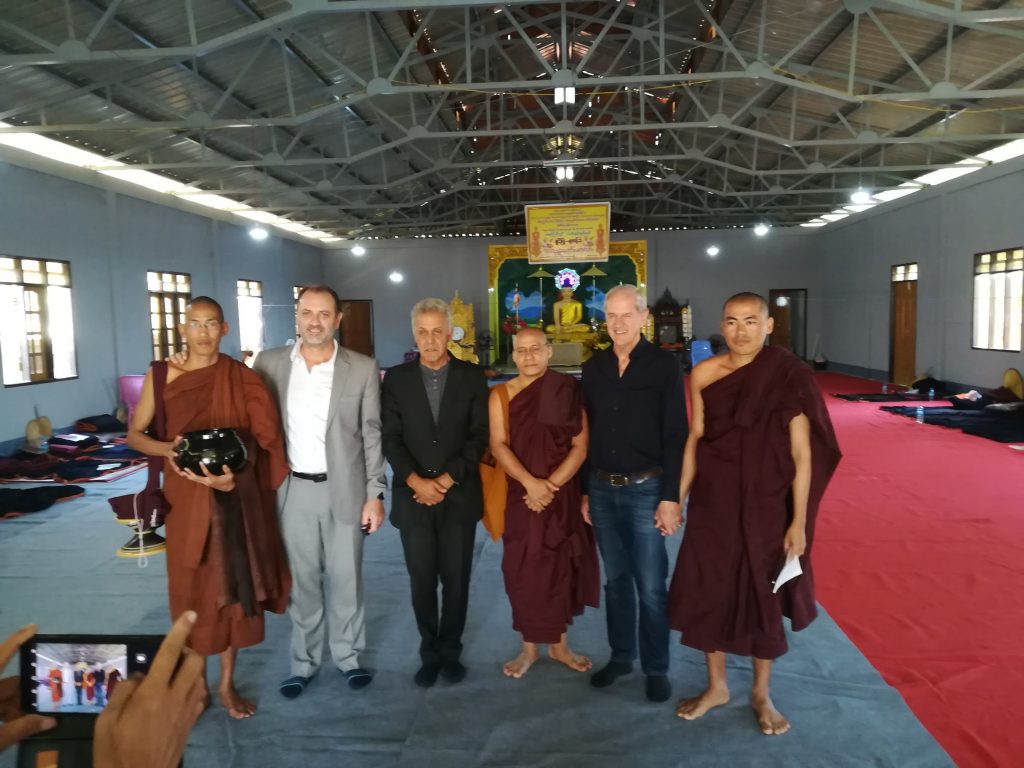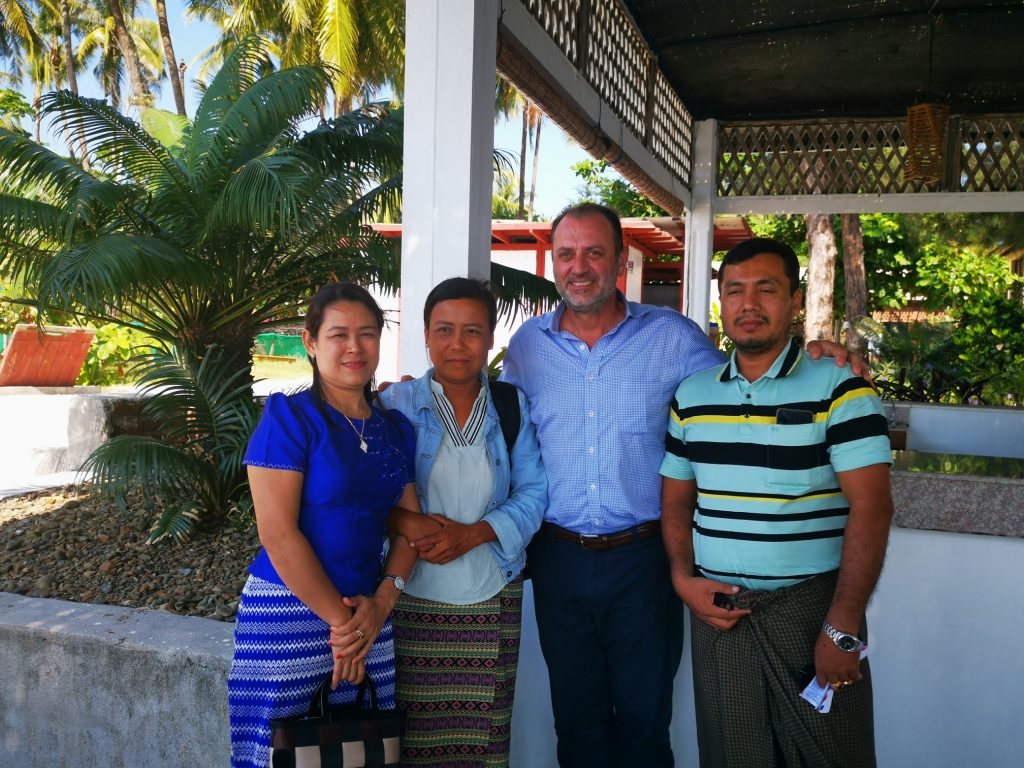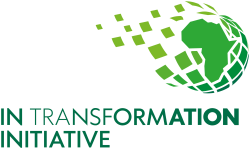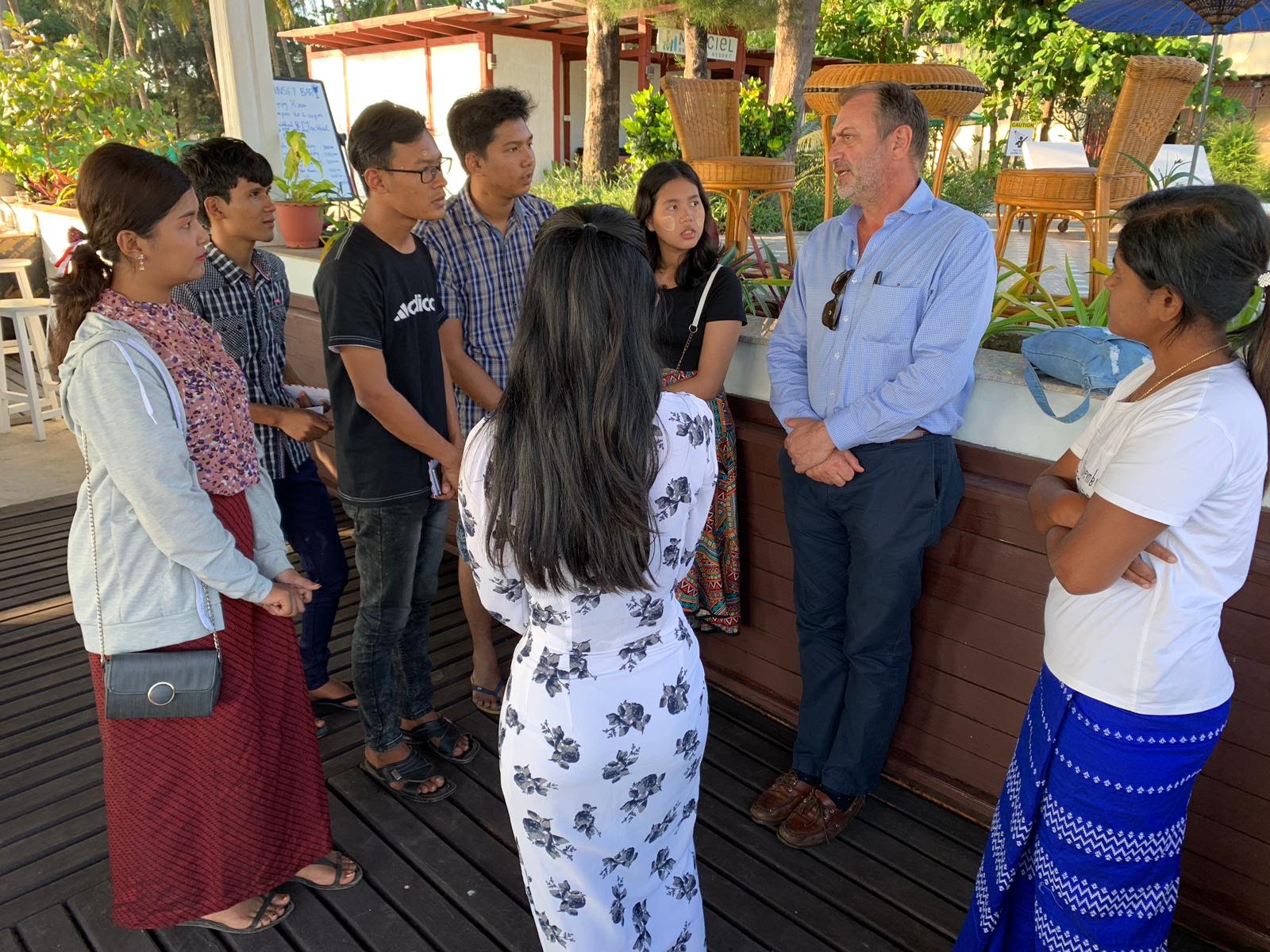The In Transformation Initiative (ITI) has been involved in dialogue and reconciliation efforts in Myanmar for the last 4 years. Liesl Louw-Vaudran spoke to Fanie du Toit, who leads ITI’s work in Myanmar, about these efforts and the implications of the recent coup d’état in the country. Listen to the podcast recording above and read the questions and answers for the interview below.
Firstly, how did you get involved in the mediation in Myanmar? What is your background?
I was involved as a 28-year-old volunteer with the Truth and Reconciliation Commission in South Africa, and after that for 16 years with the Institute for Justice and Reconciliation that worked across many conflict zones in Africa. After that, I assisted the United Nations Development Programme (UNDP) with the reintegration of communities scattered across Iraq in the aftermath of the war on ISIS. About 5 million people were displaced. Throughout these years, I did from time to time collaborate with ITI and in 2018, I was approached by Roelf Meyer, following a request to him by Aung San Suu Kyi from Myanmar. She asked him to begin a dialogue process in the Rakhine province. It was then, as it had been for decades, the hotbed of the ethno-religious conflict in Myanmar. Roelf had been on an advisory commission that sought to implement the recommendations of a report developed by a group of advisers led by Kofi Annan on how to overcome the Rakhine challenges. Roelf saw the need for community dialogue in Rakhine and on that basis, he approached me to act as the implementing lead for a community dialogue programme on behalf ITI.

For quite a long time you were actually living in Myanmar. Were you working in the refugee camps?
I certainly visited some of the IDP [Internally Displaced Peoples’] camps. Roelf visited the refugee camps in Cox’s Bazar in Bangladesh, but I was not part of that delegation. I have seen the people in the IDP camps in Rakhine, of which there are many tens of thousands. Constantly new IDP camps are created. But I lived in Yangon for considerable periods of time in 2019 and 2020. And even up to the Covid lockdown. So I got to know the country modestly well.
What does your work entail? Are you facilitating or mediating? What are you trying to achieve?
Unlike the work I did in Iraq, which is UN-based, this is project does not run through an official UN agency. I am rather acting as a technical adviser to a group of NGOs, quite influential local civic organizations, that are implementing this community dialogue program in Rakhine. I am the lead implementer and there are about 10 to 15 local people working with me. Then you have the local NGOs who work with community facilitators and enable what we call local peace committees. So, it is like creating concentric circles of influence in the hope to influence people living in these communities and to reach the right kind of leaders within those communities.
What is at the heart of the conflict? Was this a ‘genocide’ against the Rohingya Muslims?
Well, the International Court of Justice has said it cannot rule out genocide in Myanmar and I think that’s a responsible position to take. I think it’s too early to prove intention to destroy in part or whole the Rohingya Muslims, but there’s much less debate over the fact that there was a crime against humanity and/or ethnic cleansing during the attacks in 2017.
There were gross acts of violence, murder, and in some cases of sexual violence as well, which then led to the fleeing of some 700,000 of these Muslims into neighbouring Bangladesh. Another 500 000 or 600,000 have stayed behind.
Which communities are you now trying to reconcile through these peace committees?
Let me just also say that, and this will explain partly who these people are, is that the Tatmadaw, the military that’s now taken over the country, has this notorious ‘four cuts’ policy. This means when they attack any of the two dozen or so armed organizations in one of the outlying regions of Myanmar, they cut funding, food, intelligence, and recruits from these armed insurrections. And this often means direct attacks on civilian targets, with immense suffering for these communities. There are 125 ethnic groupings in these outlying areas, and that’s where the majority of this violence takes place.
So, in Rakhine, that is what the Tatmadaw did as well and aim to do and so the devastation that such a policy leaves is profound. The pressure on communities is huge when funding is cut to everybody, when food is cut, when the internet is blacked out, when anybody that’s vaguely suspected of any association with an armed insurrection is summarily detained and sometimes never comes back. It’s a massive polarization that takes place. In Rakhine the result is high tension between mainly between Rohingya Muslims and a local Buddhist ethnic group named “the Rakhine”.
Why this animosity towards Rohingya Muslims?
The Rohingya Muslims came in waves across the border for as long as history in this part of the world has been recorded, and there’s no telling when most of them arrived, but certainly not yesterday. They came partly with the British expansion in the colonial period, but also during the Second World War. There was a fair bit of intermingling because of ancient trading across what is now the Myanmar/Bangladesh border. To try and unravel that, to unscramble that omelette in an effort to determine which Muslims belong and which do not, is not only impossible, it amounts to a human rights violation since it denies people rights in the country where they were born. But this is exactly what the current regime seeks to do.
Both the local Buddhist people in Rakhine and the Rohingya Muslims form very important constituencies within the larger Rakhine society. And then there is a sizable Hindu minority as well as some Christian minorities from the Chin people that are slightly to the north of Rakhine.
So, we support communities to form local peace committees, we ask them for credible leaders from all sides of the social divides (including a balance between male and female), known not to be extremists. And it’s quite a long process of three to four months to actually get the right people – including women, youth and people from all ethnic groups – on these committees that enjoy the trust of their respective constituencies.
What activities do these committees then engage in? I remember you said at one point, they were also doing COVID-19, awareness programmes…
Yes. It’s interesting that our larger social goals like reconciliation and justice, social justice, as we also saw in South Africa, are often not best promoted by directly talking about that goal, but rather by implementing practical measures that benefit the community in such a way that these goals are achieved indirectly. So, for example, to create a common job creation project that Muslim and Buddhist communities are cooperating in, seems to be a very effective way of enhancing trust and cooperation and in the process, communities do not only learn to cooperate, but they also learnt to communicate in fresh and positive ways.
We asked one community for example what would be the first thing they want to do together, and they said we want to clean up our town. And so, they started, they rolled up their sleeves, bringing thousands of people into the streets and starting to pick up rubbish lying everywhere. Now remember, this is essentially a war-torn area. This community to which I refer, Maungdaw, was in fact the epicentre of the violence when the Muslims were driven out in 2017. With all the fear and mistrust, communities now lived in a state of isolation and constant fear. So, to see Muslims and Buddhists together, rolling up their sleeves and getting to work together to restore some semblance of normalcy to their town, was truly transformative. Of course, things do not stay merely at largely symbolic events such as anti-litter campaigns.
When COVID arrived, the profound distrust of all communities towards the government, made it very difficult for government to launch effective anti-pandemic measures. And so, it was our committees who then said, but we have access to the Muslims, and the Buddhists, work through us. So, the committees became one of the main dispensers of information and also of masks and sanitizers, in the early stages of COVID. This really demonstrated to the communities the value of having a common platform that is trusted by the people in a place where trust is in desperately short supply. On every level, even the government or the security forces are seen as party to the conflict. And so, who do you trust? Perhaps the only people you trust are those credible leaders within your own community.
Then came the coup d’etat on 1 February 2021…
Yes, and after the coup, we first thought that maybe we cannot proceed with this project. But the communities were extremely adamant that this is these committees are now more important than ever. In a sense they are correct. With the military now appointing local government officials, communities have even less faith in authorities than under the previous dispensation. And so, they are adamant that these committees continue.
While you were there, did you get a sense that people expected this military coup to happen? Or was it completely unexpected?
You know, Liesl, I was talking to a prominent analyst in Myanmar, the Saturday afternoon at lunchtime before the coup happened (on that Monday morning), about the likelihood of a coup, because there had been some saber rattling the week before. And I remember him saying to me we are now heading away from a coup. It’s not going to happen. And then on Monday morning 3am the coup happened.
Just about everybody was caught off guard. Nobody could think that the military, that has basically scripted this transition, could so radically just throw it out of the window after so many years of investing in it.
But I think the key to understanding this is the fact that the military never thought that they would truly relinquish power. But then the results of the November elections caught them off guard. They had not expected such a landslide victory for the NLD and Aung San Suu Kyi. Her runaway victory showed to them that allowing her another term may very well take power completely away from them.
Even now there is a sense that the genie’s out of the bottle, that it is too late for the military to really roll back democracy. People now have cell phones where they can connect online and experience some freedom. Having a credit card and being able to travel means a lot. People, especially the young people, don’t want to go back to how it was in the past. I think the military’s calculation was the political transition which they had originally scripted developed a life of its own, and that they could reverse that. I do not think they will be able to convince Myanmar citizens to go back to how it was before, but they are also very unlikely to give up power—hence the current stalemate.
What is surprising for outsiders I think is the determination and the courage of ordinary people just to go into the streets and risk their lives. Is that your sense as well, that ordinary people in Myanmar are just simply refusing to accept this military role?
Yes, absolutely. It reminds me a lot of some of the moments in the struggle against apartheid. The ingenuity with which young people are discrediting the military in ways that are just so cutting to the bone… They are very clever at showing the military up for the dictators that they are. In many ways this reminds me a lot of our movements in the 70s and 80s, that had managed to discredit the apartheid regime to a point where nobody would take them seriously anymore.
But the difference here is the apartheid regime was, in the end, willing to negotiate, and they were given a reasonable exit strategy. And there’s no indication whatsoever that the military even has any pretense in that direction at this stage. As long as they’ve been sponsored by China, and Russia, their two big sponsors, there’s little chance of them budging. And there’s also a little chance of the public budging on this or the West letting the generals off the hook. So, the larger picture does not look promising at this point.
Is there anything that the international community can do? Could they put pressure then on China and Russia to stop supporting the military rulers?
I would say so, but as you know, there are the realities of our superpower-dominated world and international relations. I think that path may well run via Washington, because I don’t think, China has much of the history or track record of listening to civil society, nor really does Russia. But the best chance to be taken seriously, would; lie with a “fellow superpower”, and perhaps then on arguments of mutual interest.
If it can be shown that this is not in their interest in Myanmar to descent into a failed state and what may happen to Chinese interests in such a scenario which is quite likely if the current situation is allowed to continue indefinitely, they might be persuaded. As you know, the Chinese has their “Belt and Road” initiative that they mean to run through Myanmar towards the gas fields in the Bay of Bengal. Meanwhile there is a vast narco-industry emanating from the border areas between Myanmar, Laos, Thailand, and China. If the centre disintegrates any further and loses more trust in these areas, Myanmar will become like the DRC of Southeast Asia. And is that really in China’s interest?
From a distance, it looks like they have made the calculation that supporting the military is the best way to obtain or to ensure stability. But one has to take the argument a step further and say, well, what about tomorrow and the day after? Maybe it’s not the best way?

What about protecting human rights? Or is it all about geopolitics?
Well I hate to say protecting human rights doesn’t work, because that’s what I’ve spent my life doing. But if you look at China’s policy with the Uyghurs and the legislation that India has recently passed on Muslim communities it seems that the region is not very Muslim friendly. This is despite the fact that Malaysia and Bangladesh are part of the region… I don’t know if the human rights argument will be effective.
I think that arguments of enlightened self-interest are the ones that will make most sense to the superpowers. And I think that’s what needs to be lobbied in places like Washington, and Brussels—for a coherent diplomatic push at this level. Maybe also Australia and Japan. Incidentally, I think Japan has a big role to play as a former colonial power there. They have also got some influential people that are quite close to the military leaders in Myanmar, and they have got the leverage of their investment power. But for China and Japan to cooperate, well, that is another miracle that would need to happen.
Finally, where does that leave your peace committees and ITI’s role there if this conflict drags out over time?
It’s very important to make this point that ITI will do nothing that will risk making the regime look good. We don’t regard the military junta as legitimate; they are criminals. It’s an illegitimate regime. And so, we do not engage them in any capacity whatsoever.
But at the same time, during the time that we’ve been in Myanmar we’ve made friends and have built relationships, and those people are in trouble now—very deep trouble. To walk away from them would be as bad as to make the regime look good, quite frankly. And so ITI has decided not to engage officials in Naypyidaw (the military government), in any way, but to remain engaged with our local partners in Rakhine. At the same time, we hope to remain conflict sensitive as much as we can and do our political analysis quite thoroughly so that we make sure that we don’t strengthen the regime inadvertantly.
We think that resilient communities on the ground are never a bad thing, and we will continue to work with them until it no longer benefits them.
Read More:
Myanmar: Baseline Study

